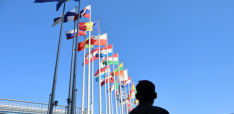The Istanbul Process - more timely then ever

Marghoob Saleem Butt, Executive Director of the IPHRC, argues that despite a slow start there are hopeful signs that the implementation of UNHRC Resolution 16/18 is about to pick up pace.
The 5th anniversary of the UN Human Rights Council Resolution 16/18 – is an appropriate time to reflect and reassess the impact of the resolution that was dedicated to “combating intolerance, negative stereotyping and stigmatization of, and discrimination, incitement to violence, and violence against persons based on religion or belief.” The poignancy of this resolution holds stark against the context of our entry into a turbulent 2016. Religious intolerance and racial discrimination in its various manifestations are on the increase, heightened and underlined by the threat of extremism globally.
Once described as a ‘poster child of OIC-US-EU co-operation’, where does the resolution stand now, 5 years after its inception? The development of the resolution hinges on ‘The Istanbul Process’, referring to the unique follow up mechanism of regular international meetings surrounding how to implement this resolution at all levels.
Thus far, there have been five annual Istanbul Process meetings, the latest held in Jeddah in June of 2015. These meetings provide the genuine space for meeting of minds on how best to combat the evil of incitement and promote the noble value of tolerance, which are fundamentals of progressive and democratic societies. Such an effort represents why the resolution represents a milestone in international diplomacy, but is arguably also a reason for its slow progress.
The question is - if consensus was reached regarding the remit of the 16/18 resolution, why has there still been relatively slow progress on implementation? The fifth, most recent meeting titled ‘from resolution to realisation’ discussed among other things the fundamental bone of contention that has been stalling implementation by the key parties – defining what constitutes incitement to violence. OIC members generally argue there is such a thing as ‘collective’ as well as individual rights that should be protected, while Western members generally advocate individual rights only. Similarly, there continue to be proponents of absolute freedom of expression who prefer combating incitement to hatred and violence only through soft measures such as dialogue, speaking out for the victims, counter or positive speech etc. Such disagreements have exposed divergent views on the scope of protection that should be afforded to both individuals and groups including religious minorities.
There is a danger that with disagreement surrounding fundamental tenets of the resolution, the historic ‘consensus’ achieved in 2011 risks being undermined - at a time when global leadership and a universal legal framework on religious intolerance is imperative.
A timely, global need
To understand the timely need for progress on the Istanbul Process, one only has to consider the current state of global affairs continuously marred by religious intolerance and discrimination. Islam has especially been victim to both of these developments, with Islamophobia on the rise, and the ascent of Islamic extremism well documented. Both these trends have a common denominator – that of identity politics being exploited to exacerbate sectarian and religious tension.
The acute religious tension experienced across the world has all-too-often reduced freedom of expression and freedom of religion arguments into populist debates, as opposed to ones revolving around Human Rights academics and politicians.
The tragic bloody narrative of 2015 was put into motion early, with the abhorrent January attacks on Charlie Hebdo offices. Later that year saw further acts of terror, from Cairo to Paris. With Daesh continuing to orchestrate worldwide terrorist attacks in the name of Islam they were simultaneously debasing the faith, and exacerbating religious tension. In fact, Daesh’s own self-professed theory of expanding their ‘Islamic State’ entails eliminating the ‘grey zone’ between Muslims and non-Muslims in the West, attacking the values of multiculturalism and fuelling hatred between the two groups to exploit fractured relations.
These developments are intrinsically tied to the resolution – all forms of religious discrimination, including Islamophobia or for that matter christianophobia or anti-semitism, have been an omnipresent, reoccurring component in the discussions of the Istanbul Process, as has religious extremism. Understanding how religious extremism perpetuates religious bigotry, and how extremism relates to stereotyping and incitement to violence is critical. As rightly pointed out by the UN Special Rapporteur on Minority Rights, “although not all hateful messages result in actual hate crimes, hate crimes rarely occur without prior stigmatization and dehumanization of targeted groups and incitement to hate incidents fuelled by religious or racial bias”.
In the wake of recent upsurge in the religion-based violence, maintaining consensus in resolution 16/18 and its effective implementation have become more important than ever.
Collective vs individual rights
Upholding the “freedom to offend” is an argument cited by many in defence of free speech. Where then, is incitement factored into this belief? Is there a definition or limit to the notion of “offend”? How far the freedom of expression can be stretched to “offend”? And at what point it crosses the threshold of incitement and becomes liable to legal proscription? The blurring of lines between race and religion has made these questions more pertinent. While the traditional Liberal approach sees racial identities and the sovereign nation state as natural and distinct from cultural and ideological identities – to deny the role of ideology and social structures in manifesting religious-cultural racisms is to deny the credibility of modern sociological views on racism.
Islamophobia is a phenomenon that holds true to these accounts; one merely has to survey the way Islamic culture has been other-ised in the West, and with it, MENA and South-East Asian culture. This is best documented in the populist anti-immigration rhetoric that is currently sweeping across Europe in the wake of the Cologne incidents. Indeed, the UK's official crime survey estimates there are about 278,000 hate crime offences committed annually, including about 185,000 racially or religiously motivated incidents. But it estimates that only 40 percent get brought to the attention of police. In London alone, the number of anti-Jewish and anti-Muslim hate crimes recorded in 2015 by police in London was 61 percent higher than in 2014. And according to the FBI’s 2014 Hate Crime Statistics, 17% of all U.S. hate crime victims were victimized because of bias against religion, with anti-Jewish and anti-Muslim incidents being the highest.
Edward Said noted the similarities historically between anti-Semitism and hostility to Islam in Europe arguing that they have ‘stemmed from the same source and nourished from the same stream’. Indeed many social commentators have made the comparison between the plight of refugees from Syria and other war torn regions in the Middle East, to Jewish refugees at the start of the 20th century. Such comparisons perhaps strengthen the suggested paradigm of contradictory approaches by Western countries to freedom of expression between Muslims and Jews. Many European countries have existing legislation embodying the collective rights of Jews through Anti-Semitism laws – which are at odds with their insistence on the individual rights with regard to incitement and freedom of expression. Additionally, without commenting on the merits of Anti-Semitism laws, the mere fact that these are selective and prioritize one religion over others in terms of protection it extends, highlight the partial and selective approach by the practicing countries.
Yet, to suggest the debate on where to draw the line between freedom of expression and the protection of minorities, or between individual vs collective rights is simply a case of West vs East would be facile Orientalism. There is a more nuanced debate happening around us in Europe and North America. Take, for example, the rise of the ‘safe space’ initiative in European and American Universities – where verbal attacks on a student’s identity are not tolerated. It is an effort to protect minorities vulnerable to discrimination, and foster fairer debate to counter social structures that unwittingly play a role in our every day lives. Equally, the New York Times’ scathing criticism that the Muhammad Art Exibit and Contest in Garland, Texas was merely an ‘exercise in bigotry and hatred’ masquerading as free speech triumphalism, reflects how the debate is evolving.
What next for the Istanbul Process?
Despite criminalization of incitement representing an enduring thorn in the side of the resolution’s realization, one major success of the Istanbul Process is an evolving diverse infrastructure facilitating its implementation. At the last Istanbul Process meeting, it was repeatedly reiterated that the resolution should be implemented with recognition of the role of all stakeholders including civil society and religious leaders.
With positive, symbolic contributions to the fight against extremism made by civil society a multi-faith universal dialogue towards peace is occurring. Further, involving civil society democratizes and improves the organic nature of law making. Some countries are already taking a lead in utilising these methods. For example, UK’s active involvement of Islamic community leaders helped create swift response from mainstream against isolated acts of incitement and assuaged any fears of a backlash. Similarly, Indonesia’s Section for promoting religious harmony under the Ministry of Religious Affairs , works in tandem with local level Inter-religious Communication Forum - displaying how civil society forums and government institutions can interact to formulate an all encompassing diverse legal framework to implement the resolution. Pakistan too has created interfaith committees at the district level, which strive for promoting interfaith harmony as well as help local administration in countering acts of incitement against minorities.
Gaps in the implementation of the resolution were, therefore, attributed to being filled by a) civil society and b) full and effective implementation of the existing anti-discrimination and hate speech legislation to all affected individuals and groups; and c) by further legal apparatus in Article 19 and 20 of the ICCPR and the Rabat Plan of Action. It was agreed that freedom of opinion remains paramount, not merely on its own merit, but also in the realm of freedom of religion – and therefore proscription of speech should be exceptional and must conform to the established criterion given in Art 19 or Art 20 of ICCPR. The Rabat Plan of Action spells out, in detail many of the recommendations in 16/18, advocating more positive non-restrictive measures to combat extremism and discrimination.
While questions still loom regarding semantics of incitement in resolution 16/18, the conclusion of meetings in Jeddah saw a resolve with regard to implementation that reflected a universal will for the resolution to be realized.
Recently, Muslim leaders convened in Morocco to discuss minority persecution in the Muslim world – a hopeful start to 2016 and a reflection of the universal drive to challenge all forms of racial and religious discrimination.
Another positive step was yet another consensus adoption of the Res 16/18 in the March Session of Human Rights Council that affirms the collective resolve of the international community on the need to working together to combat the menace of incitement to hatred, discrimination and violence based on religion, through the well established framework of international human rights law at national, regional and international levels.
Informal discussions among key Member States are also underway to formalize a core group that should steer and regularize the Istanbul Process meetings in a logical, coherent and forward-looking manner for a meaningful follow up.
With this in mind, we enter 2016 and the lead up to the next annual meeting of the Istanbul Process with determination that we can overcome these unstable, conflict-ridden times through legislation, diplomacy and engagement.
Marghoob Saleem Butt is Executive Director of the Independent Permanent Human Rights Commission (IPHRC), an expert body established by the Organization of Islamic Cooperation (OIC), the second largest inter-governmental body in the world. He was previously First Secretary of the Permanent Mission of Pakistan to the United Nations and has served as a Diplomat at the Pakistan Embassies in Spain and Mexico. Mr. Butt holds a Masters Degree in Political Science from the University of Punjab (Pakistan) and a Post Graduate Diploma in Diplomatic Studies from Oxford University.
Photo credit: Catching.Light via Foter.com / CC BY


